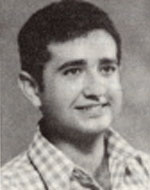Chaim-Yitzhak, son of Dina and Elijah, was born on July 20, 1948, in the Tunisian city of Tunis, and immigrated with his family to Israel in 1951. He completed his elementary studies at the Dror School in Kiryat Eliezer. Life, or life, as his friends fondly called him, grew up in his grandmother’s house. His mother died of a serious illness when he was just forty days old. When she realized her approaching death, she asked her mother to raise the newborn baby, and the uncle penned the two with the sweat of his nose. His grandmother also helped her sit in the candlelight, earning a little money. When he was two, his grandmother decided to immigrate to Israel with him, and she did. In 1951, they moved to Israel and lived with them for seven years in Tirat Hacarmel, and moved to live in Kiryat Eliezer in 1951. Haim was very attached to his uncle and grandmother, and he did not know that they were not his parents. His brother Haim, and his brother, who lived in the house of his father, his older brother and sister, and only when he was ten years old did they tell him about it. He was drafted into the IDF in mid-December 1966, when he was only seventeen years old. After basic training, and after completing his tank training course and a course for tank commanders, he was assigned to an armored unit in an armored unit in the north. Not long afterward he participated in the 1967 war and was awarded the “Six Day War”. Haimo loved the army very much. He dreamed of serving in the army from an early age, and now that his dream came true, he knew how to withstand the difficult moments, the training and the operations, and faithfully did everything he had. He acquired new friends and learned to work and pay attention and thought to detail. In 1969 Chaim was discharged from regular service and since then was called for periods of active reserve duty. When he returned to civilian life, he did not know what kind of job he would choose, because he did not learn a profession that could support him with dignity. He therefore decided to return to the army and continue serving as a soldier in the career army. He served as a guide at the Armored Corps School and was appointed a disciplinary sergeant at the school. During his service in the army, he completed a course in milling and honing at Israel Aircraft Industries, and was later accepted to work in this field in “Badek”. In May 1972 he married his wife Rachel, who was a partner in everything he had done in the army and at work. The two lived in his brother’s apartment in Lod. Haimo wanted to live in Lod because of the closeness to all the other brothers, and because of his proximity to work. The couple decided to build their home in their neighborhood at that time, and they bought furniture and all the other things needed for the house. Together they waited for March 1974, to move to their new home, and to establish a family name and a shared life. They longed to have children, because they loved children very much. Haimo used to bring many presents to his cousins Yehuda, who treated him as a child. He continued his work with the “test” and this was the first work he loved and devoted to his energy and computer. Encouraged by his wife Rachel and other members of his family, he continued his work with a “test,” as he never did in his previous works. “No doubt,” everyone said, “our spoiled child has grown into a man.” It was clear that he had gone through something in the army. He became very responsible and could take on the burden of supporting a family. During the Yom Kippur War, Haimo took part in the large armored battles in the Golan Heights. During the battle that took place on the 7th of Tishrei 5740 (7.10.1973) in the area of the quarry near Naqf, his tank was hit by a direct fire from a Syrian tank. Haim was killed and brought to eternal rest in the Haifa cemetery. He left behind a wife, three sisters and three brothers. After his fall, he was promoted to First Sergeant. In a letter of condolence to the bereaved family, his commander wrote: “Haim was an outstanding tank crew member and loved by all his friends.”His family commemorated his name by inserting a Torah scroll into the Beit-Baruch synagogue in Lod.
